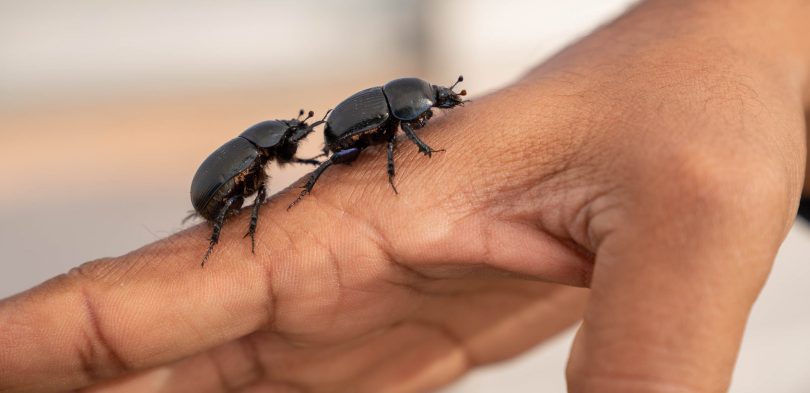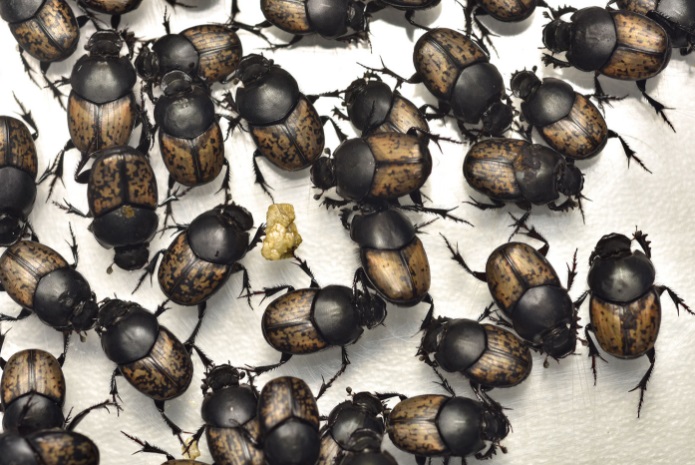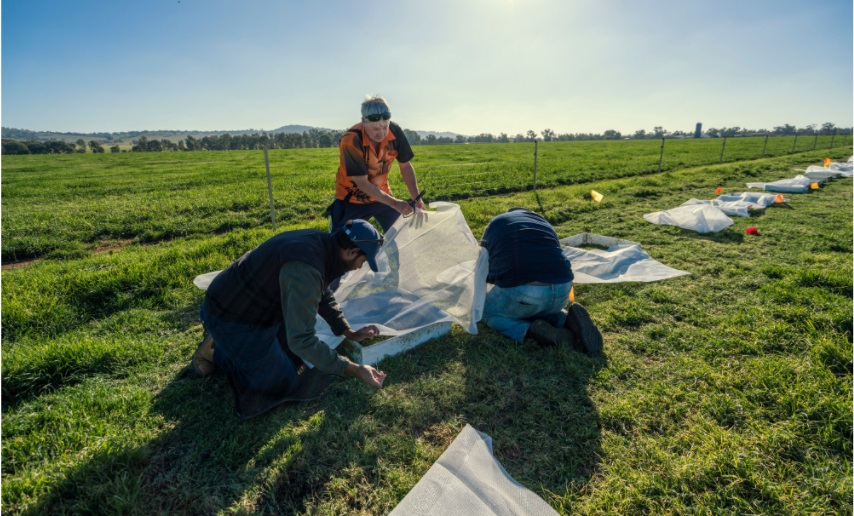
The mass rearing and release of the Onthophagus vacca (pictured above) has been successful so far, with more than 10,000 beetles reared at the research facility at Charles Sturt University in Wagga Wagga in recent months. Photo: BDEE.
Australia’s newest immigrants aren’t likely to be seen strolling the city streets, but they’re here to do a dirty little job that will hopefully change the nation.
More than 300 of the Onthophagus andalusicus beetles (yes, try to say that) arrived safely at Canberra’s CSIRO importation facility last week after a journey lasting more than a year.
The world-tripping dung beetles left their native Morocco in 2019, enjoying a stint of stringent cleaning in the south of France before heading down to Australia.
Their arrival in the nation’s capital has been lauded an international COVID logistical triumph and perhaps trumps the efforts of many ex-pats still pining for the smell of eucalypts.
The importation of the new species also marks a significant milestone in the Dung Beetle Ecosystem Engineers (DBEE) project – this the fourth major national effort to introduce them to our shores.
For a range of reasons the dung beetle, which has native and exotic representation in Australia, has been slow to spread across the country with current populations not effectively managed in areas where they can best impact change.
These introduced species are credited with the significant reduction of fly and nematode pest numbers in Australia, improvement of pasture growth and recycling of soil carbon and nutrients.

The O. andalusicus variety of dung beetle has arrived in Canberra from their native Morocco, via France. Photo: DBEE.
Arriving in Australia in secure packages, the offspring of O. andalusicus were delivered to Australian biosecurity officials for review before arriving at the CSIRO beetle importation facility in Canberra.
Even there, the beetles face strict screening procedures to ensure no potentially harmful microbes or other pests are introduced into Australian ecosystems.
COVID-19 restrictions, international border closures and nation-wide lockdowns initially caused some logistical problems with importation however, O. andalusicus arrived safely at the CSIRO site on-time and with a clean bill of health.
DBEE’s lead of dung beetle importation, CSIRO’s Dr Valerie Caron said the arrival of the beetles heralds a triumph for the project.
“The efforts of all those behind this project have been tremendous in the face of the challenges of COVID-19, including border closures, national lockdowns and fewer international freight flights,” she said.
“Amazingly, we’re still on schedule.”
O. andalusicus is the second species to be imported to Australia through the DBEE project, which aims to import three new species to fill current seasonal and geographic gaps of dung beetle activity in southern Australia.

Dung beetle research being undertaken at CSU’s Wagga Wagga campus. Photo: DBEE.
Like their place of origin – northern Africa – it’s estimated the beetle will thrive in climatic conditions similar to those in central and south Western Australia, southeast Southern Australia, northwest Victoria and central and southwest NSW.
The species is active in late winter and spring, in both beef and sheep dung – a huge plus for mixed farmers.
DBEE’s lead of training, education and information delivery is Charles Sturt University Professor Leslie Weston.
She says an abundance of dung beetles could enhance pasture quality across southern Australia while reducing pest burdens, producing an estimated net benefit to farmers in excess of $100/ha in the more intensively grazed areas.
“These beetles will help fill the spring gap in beetle activity across southern Australia and complement the first species of beetle the DBEE team has successfully imported, mass-reared and released, Onthophagus vacca,” she said.
“Importantly, Onthophagus andalusicus typically doesn’t compete with native species which prefer kangaroo and native animal dung, meaning these beetles can safely cohabitate with existing natives” Professor Weston said.
But there still is work to be done.
Professor Weston said understanding the ecological impact of releasing a new species was a lengthy and complicated part of the assessment process.
“Care is taken to ensure the beetles have little to no impact on the native ecosystems,” she said.
“Previous experience has shown us that hundreds of thousands of beetles need to be released in order to establish a new species successfully, therefore several generations are raised under lab and protected field conditions to bulk up numbers.
Professor Weston said the mass rearing and release of the Onthophagus vacca had been very successful with more than 10,000 beetles reared at the research facility at Charles Sturt in Wagga Wagga in recent months and in excess of 5000 released on more than 30 farms across southern Australia.
“We expect the mass rearing of O. andalusicus to generate similar results with time,” she added.
Initially seen as pest control mechanism, further research into the species has highlighted their significant impact on pasture growth, soil health and carbon sequestration.
The new imports bring with them hopes of filling seasonal and geographic distribution gaps across southern Australia by introducing new dung beetle species and expanding the distribution of existing species.
Original Article published by Edwina Mason on About Regional.











